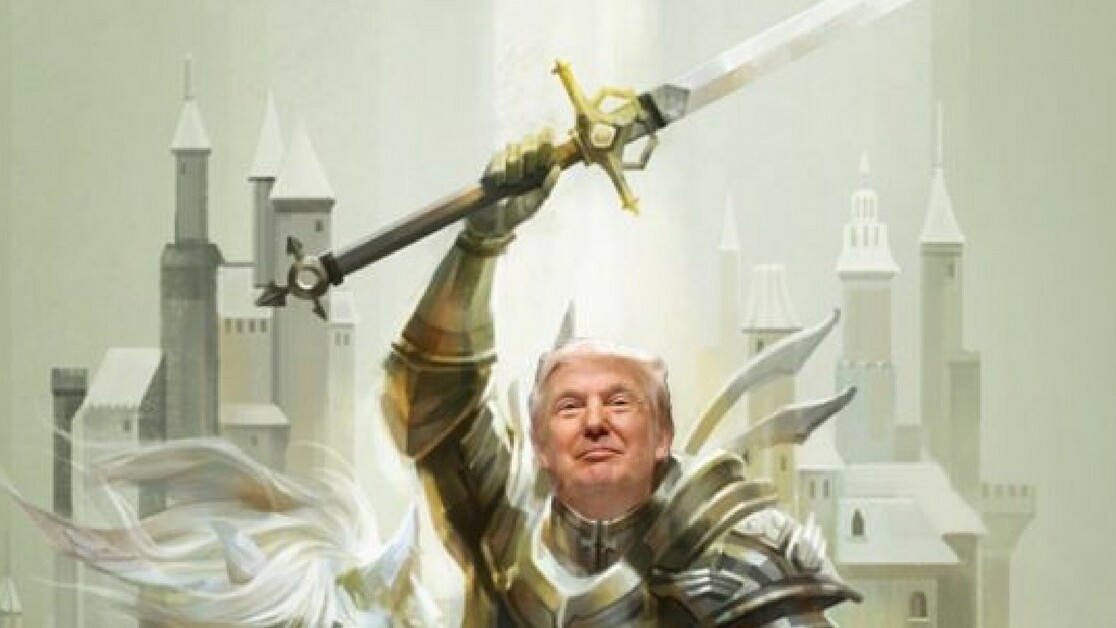
Deus Vult, or ‘God wills it’, arose as the rallying cry of soldiers of the First Crusade. Back in 1095, Pope Urban II requested help for the Eastern Orthodox Church to defend himself from the Seljuk invasion of Anatolia.
As such, Deus Vult grew into a historical catchphrase intended to align people into recapturing the Holy Land.
Roughly a millennium later, Deus Vult is simultaneously adopted by gamers, 4chan-shitposters, Trump supporters, and protesting Islamophobes. How can one trace these uses of the meme?
This article will contextualize these various spheres, and with it, show how Deus Vult ‘mutated’ from a relatively harmless gaming-meme to an arguably more problematic catchphrase and symbol for the far right – both online and offline.
Probable origins: The 4chan meme-machine
As a true cultural meme, Deus Vult has survived extinction for almost a millennium, as it is still found on online forums. Like many Internet memes, the online origins of Deus Vult seem to lie in the imageboard 4chan, where it was used from 2014 onwards.
A board known for its transgression, racism, and Islamophobia, the ‘Politically Incorrect’ board 4chan/pol/ appropriated the sentence to utter anti-immigration and anti-Islam sentiments.
Most of the comments (csv data) simply state ‘DEUS VULT!’ in relation to news or pictures regarding immigrants in Europe or troubles in the Middle East.
These comments then often promote Christian worldviews. For instance, the meme was widely posted when the Pope condemned violence in Syria. The graph below shows the number of posts and comments containing ‘deus vult’ on 4chan/pol/:
Crusader Kings and Europea Universalis IV
While Deus Vult on 4chan/pol/ might be indicative of a larger reactionary culture already, on Reddit, the early use of the meme (2014-2015) was arguably more innocent.
The second histogram above (link) indicates the number of mentions of the Deus Vult meme on Reddit.
While the meme is used more often on Reddit, 4chan did use it more often in its ‘early days’ in 2014 and 2015, buttressing the infamous characterization of 4chan as the meme-making machine of the Internet.
The following graph shows the number of comments containing ‘deus vult’, separated by subreddits:
As such, Deus Vult became a meme within the Crusader Kings userbase, sometimes in reference to remove ‘kebab‘ (Internet slang for Turkish people), loosely harking back to the Seljuk Turks from the original First Crusade:
Europea Universalis IV (r/eu4, the pink line on top), a similar strategy game, also contained the words ‘deus vult’. In EU4, Deus Vult is an actual game mechanism, so the words were used more formally:
On r/worldnews, the sentence was mostly used as a joke in reference to the European immigration crisis or international dealings with Turkey. Two religious subreddits also used the meme: r/Catholicism and r/Christianity. While its usage was largely comical here too, on r/Christianity, more sincere comments referencing Deus Vult appear:
Because r/The_Donald wills it
After the announcement that Donald Trump would partake in the 2016 US Presidential Elections, the now infamous subreddit r/The_Donald quickly grew as a bastion for online Trump-supporters.
Many memes flourished on the subreddit, and from January 2016 on, Deus Vult would be amongst them – perhaps inspired by /pol/’s early use of the meme.
Detached from a purely gaming-related connotation, the use of the meme might be considered more troublesome on a subreddit as r/The_Donald, where in-jokes and irony are fluidly mixed with more serious politics.
Still, r/The_Donald’s appropriation of Deus Vult is emblematic for the ambiguity of political ‘shitposting’: it is nigh impossible to determine the shitposter’s sincerity. Still, its transgressive appeal nonetheless helps in amplifying the meme’s resonance, and therewith broader meaning.
While the Deus Vult-shitposters on r/The_Donald might not actually call for a Crusade, the two words do offer an easy and notably funny package to propagate an (at least semi-serious) anti-Islam narrative.
While the Deus Vult-shitposter on r/The_Donald might seek defense in their irony, this irony knows a deeper layer since the mindless use of the meme is similar to the propagation of religion, rendering the Deus Vulter more politically sincere than he might realize.
In a blog post, Tara Isabella Burton frames the use of a meme as a connective device that functions like religious symbols:
Religion often functions in this sense as a kind of dictionary: a compendium of symbols and their meaning that also allows for shared communal discourse. […] The shitposter can say whatever he wants, but the second he says “praise Kek,” he’s tempering his individuality with solidarity.
He’s not a Lone Ranger but rather part of a group whose stated fascination with cowboy individualism is at odds with the intense collectivism of internet culture — a culture where likes, reposts, up-votes, hearts, and other expressions of communal acceptance take on outsize importance.
While Burton focuses on another meme (i.e. the Cult of Kek), her framing is all the more fitting for Deus Vult, since the Crusader-meme actually embodies a religious statement.
The Deus Vult-shitposter’s outcry might be drenched in irony, but its political use both collectivizes and propagates a set of (albeit loose) anti-Islamic, Christian ideas – which, as we will touch upon later, does not necessarily have to be limited to online forums.
Playful use in For Honor
Still, it is important to make a distinction between the uses of Deus Vult in relation to pure politics or play.
In 2017, the Crusader-meme exploded on Reddit. In early 2017, the medieval fighter/action game For Honor was released. It featured a ‘knight’ faction, which players could join to fight other factions with, such as the samurai. Soon, members of the knights-faction adopted Deus Vult as a 21st-century version of the rallying cry.
This caused a significant uptick in the use of the word on Reddit, mostly r/forhonor:
The previous connotation of Deus Vult as a right-wing meme by e.g. 4chan and The_Donald led the videogames-journalists at Polygon to associate the ‘alt-right’s’ use of the meme with For Honor-fans, accusing the gamers of propagating hate speech.
However, while it has questionable connotations when used in political spheres such as The_Donald, in the context of For Honor, Deus Vult seems devoid of serious politics and remains largely contained in the magic circle of play.
Looking at the larger trend in Reddit via the above visualization, For Honor (pink) quickly dropped the widespread use of the meme. However, it remained constant on The_Donald (turquoise), with around 400 comments mentioning the two words per month, outliving the ephemerality of usual memes.
While most often a text-based meme, many visual representations had also emerged, most frequently portraying a knight in white and silver armor with red crosses.

From online transgression to offline aggression
Memes, in their original definition, are by no means bound to the digital.
While even The_Donald’s use of Deus Vult could be sketched as harmless transgression, the disastrous Unite the Right rally in Charlottesville in August 2017 showed how online transgression can make the jump to offline aggression.
During the protests, the Deus Vult-meme was pitched next to serious political extremism.
The Christian cross associated with Deus Vult, e.g. seen in the image above, appeared on the armors and shields of extremists protestors.
As such, the Christian meme entered the ranks of other meme-y symbolics on site, like the Kekistan flags, but also historically extremist signs such as Confederate Flags, National Socialist imagery, and Identitarian symbols (this Washington Post-article offers an exploration of Charlottesville’s signs).
While online Deus Vult-shitposters could defend themselves by claiming it is all a joke, the aggression and lethal damage of the Charlottesville-protests arguably stripped the meme’s appearance on the scene from its veil of innocence.
Soon after the protests, an article underwritten by 29 organizations of historians denounced the usage of the meme – not just for its discriminatory connotation, but also because of its blatant inaccuracy. As the blog post opens:
As scholars of the medieval world we are disturbed by the use of a nostalgic but inaccurate myth of the Middle Ages by racist movements in the United States. By using imagined medieval symbols, or names drawn from medieval terminology, they create a fantasy of a pure, white Europe that bears no relationship to reality.
This fantasy not only hurts people in the present, it also distorts the past. Medieval Europe was diverse religiously, culturally, and ethnically, and medieval Europe was not the entire medieval world.
Scholars disagree about the motivations of the Crusades—or, indeed, whether the idea of “crusade” is a medieval one or came later—but it is clear that racial purity was not primary among them.
The imagery of the online far-right often sympathizes with spectacular imagery, e.g. using fantasy worlds, esotericism, or mythologized history.
For instance, some white supremacists draw from Odinism to legitimize their racism, while 4chan/pol/ sprouted the ‘Cult of Kek’, which envisions a faux-religious praise of Pepe and Trump, amongst other figures. In this context, Deus Vult fits comfortably between the multitudinous attempts to portray far-right politics as a grandiose and religious vocation.
Again, the Middle Ages can then serve as a constructed reference point to frame this campaign.
Apart from Deus Vult’s offline appearance in white supremacists rallies, the sentence was also sprayed on various Mosques in the UK and the USA, as well as sparking outrage at a Portland University. These offline uses indicate an Islamophobic sentiment that oversteps the boundaries of ambiguous shitposting towards serious offenses.

While some use of outcrying ‘Deus Vult!’ might be relatively innocent, the various usages of online and offline appearances indicate both harmless plays, as well as a slippery slope of transgressive memery leading to political extremism.
The Christian cross associated with Deus Vult, e.g. seen in the images above, appeared on the armors and shields of extremists protestors.
Deus Vult’s numerous contexts emphasize the necessity to trace and connote what subversive styles are harmless and which are indicative of larger and more problematic political trends.
As such, resisting the ease to generalize far right’s political catchphrases and instead understand their many contexts allows discerning playful symptoms from political disease.
This article was originally published by OILab. The Open Intelligence Lab (OILab) is an Amsterdam-based collective of interdisciplinary researchers. Its efforts concern the scrutiny of (new) political cultures on digital platforms using digital methods and qualitative research. Since data is the new oil, OILab strives to ‘extract’ this source to make sense of new forms of politics in the digital sphere.
Get the TNW newsletter
Get the most important tech news in your inbox each week.










